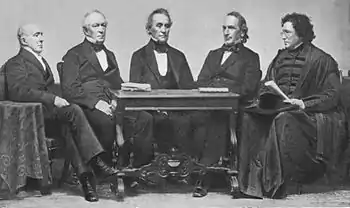President and Fellows of Harvard College
The President and Fellows of Harvard College (also called the Harvard Corporation or just the Corporation) is the smaller and more powerful of Harvard University's two governing boards, and the oldest corporation in the United States.[1] Together with the Board of Overseers, the two boards exercise institutional roles more commonly consolidated into a board of trustees.[2]
Although the institution it governs has grown into a university of which Harvard College is one component, the corporation's formal title remains "The President and Fellows of Harvard College".[3]
History

In 1650, at the request of Harvard President Henry Dunster, the Great and General Court of Massachusetts issued the body's charter, making it the oldest corporation in what became the United States. The subsequent Constitution of the Commonwealth of Massachusetts confirmed that, despite the change in government due to the American Revolution, the corporation would continue to "have, hold, use, exercise and enjoy" its property and legal privileges.[4]
The corporation was probably originally intended to be a body of the school's resident instructors, similar to the fellows of an Oxbridge college. However, it fell into the now-familiar American model of a governing board—an outside body whose members are not involved in the institution's daily life, which meets periodically to consult with the day-to-day head, the president (whom it appoints). The Corporation is self-perpetuating, appointing new members to fill its own vacancies as they arise. The Charter of 1650 established the Harvard Corporation board which consisted of seven members: a President, five Fellows, and a Treasurer. The Corporation had the authority to manage the College's finances, real estate, and donations, act as a legal entity in courts of law, select officers and servants, and create orders and bylaws for the College, with the approval of the Board of Overseers.[5]
The founding members of the Harvard Corporation were respectively: Henry Dunster as President, Samuel Mather, Samuel Danforth, Jonathan Mitchell, Comfort Starr and Samuel Eaton as the five Fellows and Thomas Danforth as the Treasurer.[6] These men had, in perpetual succession, the duties of managing the College.
For most of its history, the Corporation consisted of six fellows in addition to the president. But after the abortive presidency of Lawrence Summers and a large endowment decline in 2008–2009, a year-long governance review was conducted. In December 2010, it announced that the Corporation's "composition, structure, and practices" would be greatly altered: the number of fellows would increase from six to twelve, with prescribed terms of service, and several new committees would endeavor to improve the group's integration with the activities of the University as a whole, especially its long-term planning.[7]
Current membership
There are currently twelve members of the Corporation, including the University president, who sets the agenda but does not vote.[8][9]
| Name | Degree | Year appointed | Occupation |
|---|---|---|---|
| Claudine Gay | BA 1992 (Stanford), PhD 1998 | 2023 | President of Harvard University |
| Timothy R. Barakett, Treasurer | AB 1987, MBA 1993 | 2019[10] | former CEO of Atticus Capital |
| Kenneth Chenault | JD 1976 | 2014[11] | former CEO of American Express |
| Paul Finnegan | AB 1975, MBA 1982 | 2012[12] | co-CEO of Madison Dearborn Partners |
| Mariano-Florentino Cuéllar | AB 1993, JD 1997 (Yale), PhD 2000 (Stanford) | 2019[10] | President of the Carnegie Endowment for International Peace and former Justice of the Supreme Court of California |
| Carolyn Martin | PhD 1985 (University of Wisconsin–Madison) | 2018[13] | President Emerita of Amherst College |
| Karen Mills | AB 1975, MBA 1977 | 2014[11] | former Administrator of the U.S. Small Business Administration |
| Diana L. Nelson | AB 1985 | 2018[14] | chair of Carlson Holdings |
| Penny Pritzker, Senior Fellow | AB 1981 | 2018[13] | former United States Secretary of Commerce |
| Tracy P. Palandjian | AB 1993, MBA 1997 | 2022[15] | co-founder and CEO of Social Finance (consultancy) |
| Shirley M. Tilghman | LLD 2004 (Honorary) | 2017 | former president of Princeton University |
| Ted Wells | JD 1976, MBA 1976 | 2013[16] | partner at Paul, Weiss, Rifkind, Wharton & Garrison |
References
- "Harvard Corporation". www.harvard.edu. Harvard University. Retrieved November 8, 2022.
- "Leadership and Governance". Harvard University. Retrieved April 29, 2021.
- Chait, Richard P.; Daniel, D. Ronald; Lorsch, Jay W.; Rosovsky, Henry (May–June 2006). "Governing Harvard: A Harvard Magazine Roundtable". Harvard Magazine.
- "Chapter V". Massachusetts Constitution.
- "Collection: Charters and legislative acts relating to the governance of Harvard | HOLLIS for".
- "Research Guides: Harvard Presidential Insignia: Harvard Charter of 1650".
- "Governance Review Culminates in Changes to Harvard Corporation". Harvard Gazette. Harvard University. December 6, 2010. Retrieved December 6, 2010.
- Dixon, Brandon J.; Parker, Claire E. (June 27, 2017). "The Harvard Corporation, Explained". The Harvard Crimson. Retrieved April 29, 2021.
- University, Harvard. "Harvard Corporation". Harvard University. Retrieved July 7, 2023.
- "Two elected to Harvard Corporation". Harvard Gazette. Harvard University. February 11, 2019. Retrieved August 24, 2020.
- "Kenneth Chenault and Karen Gordon Mills to join Harvard Corporation". Harvard Gazette. Harvard University. February 10, 2014. Retrieved June 15, 2015.
- "Finnegan elected to Corporation". Harvard Gazette. Harvard University. May 23, 2012. Retrieved June 15, 2015.
- "Harvard Corporation elects two new members". Harvard Gazette. Harvard University. May 23, 2018. Retrieved October 20, 2018.
- "New Corporation member named". Harvard Gazette. Harvard University. February 10, 2020. Retrieved August 24, 2020.
- "Tracy Palandjian elected to Harvard Corporation". Harvard Gazette. Harvard University. April 4, 2022. Retrieved August 27, 2022.
- "Mathews and Wells elected to Harvard Corporation". Harvard Gazette. Harvard University. September 23, 2012. Retrieved August 24, 2020.